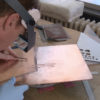Distribution | Film Funding | Filmmaking | How To's | Screenwriting | Short Films
Get Shorter: Advice to the Short Filmmaker
Written by Andrew Slattery | Posted by: Anonymous
PRE-PRODUCTION
How do I write a short film script?
Write it your way. Your idea may be similar to a joke, ending with the last scene as punch line/plot twist, but don’t rely on that to make your film interesting. The telling of the "joke" must be interesting as well. You can achieve this with a combination of visual technique and slick dialogue. Your short will probably run between five and 15 minutes, so forget grandiose themes, convoluted plots, and back-story; you’ve got five minutes to wow the audience. Don’t try and squeeze "Get Shorty" or "Vertigo" into that. Establish what’s going on and progress through the action. Play around with form: see how "Pulp Fiction" delivered plot information out of sequence and how "To Die For" combined documentary and drama. Interesting characters are a story. (Plot synopsis for "Leaving Las Vegas": "This guy drinks himself to death?") Experiment with dialogue. See how the mise-en-scene and camerawork in "Glengarry Glen Ross" are subordinate to character and dialogue.
Once you’re writing, don’t worry about formatting your script perfectly; just keep directions and dialogue clear and consistent. Get your idea down, but consider it temporary. Make copies and hand them out to friends and crew for criticism. Rewrite at least five times. Each time you rewrite, you will develop a stronger vision of the film. This will eliminate ambiguity during the shoot. Write an economical synopsis for your film.
Okay, you’ve written your amazing script–now go out and find people to help you make it!
How do I find a good cast & crew?
Remove the creative part of your brain and engage your business acumen. (It’s sitting somewhere in the frontal lobe.) Just because you have no money, there’s no need to compromise on cast/crew experience. Are you in school? If not, you may want to connect with people who are. Remember: most people working on no-budget projects prefer to work on their own scripts, so you’ll need extra weapons. Are there any small theater groups in your area? Get some talented local actors interested; experience will sweeten the pot for others. You don’t need to go to film school to learn how to network people into your script. But school doesn’t hurt when it comes to accessing equipment.
How do I access all the equipment I need?
If you’re at a school with equipment, use it, or seek out other organizations that have it. Cable access stations are a place to start. Cut down on expenses entirely by borrowing a video camera from someone. Don’t worry about the cruddy VHS look; your fascinating characters and dialogue will make your short interesting to watch. Borrow lamps and lights and a tripod from your uncle who gave up photography years ago. Read about framing, panning, tracking, and different styles of lighting. Steal your cousin’s new skateboard with those super-smooth wheels and devise a way to mount your camera on the skateboard for impressive tracking shots. Consider what music you’ll use during editing and let that influence your choice of shot composition and duration. Join a film club. Post all your questions to NewsGroups. Read more! [Pub. Note: You can also rent equipment through the Boston Film Video Foundation affordably. See all equipment rental places in NewEnglandFilm.com’s Industry Directory.]
How do I find suitable locations?
When you wrote your first and second drafts, you probably imagined shooting in faraway, exotic locations. Cool, but are there visually aesthetic locales closer to home that would look groovy in your frame? Do they suit the narrative? Is it practical to take your cast and crew there? Approach the owners of these places. Explain your objectives, and maybe they’ll oblige their property for your shoot. Are there facilities and food nearby? If it’s a public park or beach, call the city to secure permits. You don’t want to be halfway through a take and have the police arrive on set asking for your permit. Think about where the sun will be in relation to that location when you’ll be there. Make a reflector board. Go over the lock with your director or DP (director of photography).
What’s a production meeting, & what do I do there?
In general, the meeting is a relaxed form of communication on neutral territory, where cast and crew can discuss the film and get to know who they’re working with. In particular, there are a few things you should do at a production meeting. Have the actors read through the script once and encourage everyone to brainstorm about plot, characters, and technical aspects. You have a strong vision of the film in your head, so when your lead actor asks you a heavy question about character motivation, you’re ready. Don’t direct the actors at this stage; just help them understand their characters’ function and motivation in the total film. Establish times and dates for shooting. Do you have a rain plan? Make sure everyone has a list of cast and crew phone numbers. Encourage your actors to improvise on wardrobe according to the limits of their characters. Go through the script with your main collaborator and draw up a shot list or storyboard. A shot list is good enough. The shoot is an adventure, and the shot list is your map.
PRODUCTION
How do I manage the shoot?Somehow you’ve gone from knowing no one to writing and producing (and/or directing, but probably not yet) your first short film. It’s the day of the shoot. Your next seven hours will be intense. You will make 374 mistakes during the shoot, but every one will have two lessons attached to it. You’re making your short film; you’re making progress. Copy your shot list for the crew. Some shots might take a while to set up. Ask a friend to help out with reading the script with the actors. Ask another friend to take a roll of black-and-white stills, very handy for any publicity your film receives. Keep an eye on the goings-on around your location–cars, weather, people. You might see extras potential in some passersby. You’ve spent six weeks preparing for this shoot, and now everything’s going smoothly. But now it’s lunchtime.
How do I feed the cast and crew?
Up to now, your only costs should have been telephone calls and other correspondence, and maybe some materials for that prop you just had to have ("Tomato sauce just doesn’t look real."). Now you must spend a dollar or two. Your actors are working for nothing; at least you can feed them. Shooting is intense, and frustrations are easier to field when stomachs are full. Buy a carton of water, and set up some coffee for everyone. Get Mummy to make those super chicken and cheese sandwiches–80 of them.
How do I direct?
So long as your crew knows your aims, you can delegate tasks to your technical crew. Just know that your film is not going to turn out exactly as you thought/hoped it would. It never does. If you’re unsure about a camera set-up you’re using, try the same scene with a different set-up. The actors will catch on to this experimentation and will improvise on their part, too. During editing, you’ll be glad you got different shot styles for the same scene. It’s only video, so shoot about 40 minutes for your five-to-ten-minute short. Get your takes with continuity in mind. The good takes are the materials you’ll build your film with in the editing room. Directing experienced actors? You read about directing during pre-production, but you haven’t actually done it, so don’t act like you have. They know the script; they know their characters; and they know you’re inexperienced. You’ll be surprised at how much they’ll direct themselves. If you’re not happy with an aspect of their performance, discuss it with them. Be diplomatic. Avoid telling them how to say a line; rather, remind them of their character’s motivation. Ultimately, they’ll say it their way. When they do a good take, praise them. When they do a bad take, praise what was good about that take. If you’re a writer/director, you’re also a psychologist. You’re not paying these actors $2 million, so don’t expect a $2 million performance. And if you have time to remember it, have fun.
See Andrew's post-production advice in the February issue of NewEnglandFilm.com.











